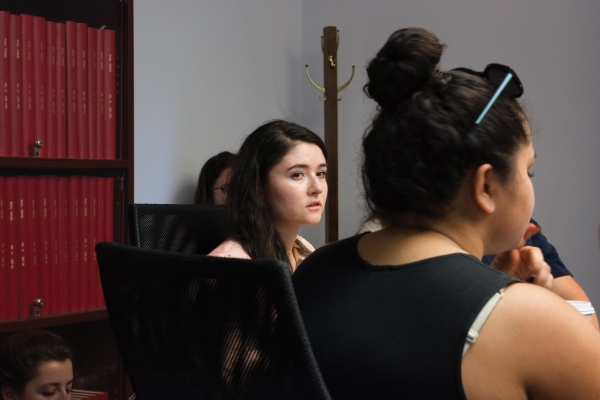If you didn't understand last week's highly technical debate over the constitutionality of the composition of the Students' Society of McGill University (SSMU)'s Board of Directors, you may be in luck. Underlying that debate was an entirely different issue, one much more familiar to students—the dispute over the Boycott, Divestment, and Sanctions (BDS) movement at McGill.
On the surface, the Board meeting on Sept. 26 was dominated by a lengthy discussion of whether or not the 12 directors currently sitting on the Board fulfilled the requirements of the SSMU Constitution, which stipulates that four of the members should come from the SSMU executive. Given the resignations of two SSMU executives in winter 2017, the number of executives on the Board had fallen to three, and the vacant spots were filled with Members-at-Large, in accordance with the Constitution.
But, while the debate may have been framed around constitutional issues, the way it unfolded suggested that it wasn't just a debate about the Constitution. It was about BDS. More than any constitutional issue, the whole controversy surrounding the Board of Directors showed how deeply the issue of BDS has become embedded in McGill’s student politics, and the kind of dysfunction that can result.
Upper-year students are by now well-accustomed to the ongoing controversy over the BDS movement at McGill. The latest round of the debate began after the Board’s Sept. 17 vote to ratify the J-Board's ruling on BDS passed with 11 votes in favour, and one abstention. The week after—at the very next meeting of the Board—came the issue of the Board's constitutionality.
This timing was an early sign that the debate over the constitutionality of the Board had an additional dimension to it. Minutes from previous sessions show that the Board had been meeting and passing motions with less than four SSMU executives since at least March 2017, and yet, the issue of constitutionality was never raised, nor were the Board's decisions questioned. It was only after the decision to ratify the BDS ruling that objections were made to a composition that by then had been in effect for months. Even more revealing is that the charge of unconstitutionality was brought forward by the only Director who had not voted in favour of the previous week's ratification of the J-Board’s ruling against BDS. Although she voted in favour of the ruling, after the fact, Vice-President (VP) Internal Maya Koparkar also agreed with allegations of the board’s unconstitutionality.
The unfolding of the Board's discussion on Sept. 26 provided further signs that the issue of constitutionality was being approached through the lens of BDS. The sensitivity of BDS explains why the subject of the validity of the Board's recent decisions came up early, and often. It explains why the discussion carried on even after SSMU General Manager Ryan Hughes informed the Board that the SSMU's legal counsel had assured him that, while the Board must move to appoint another executive by its next meeting, its composition was still constitutional, if murky. And it certainly explains how a discussion about constitutionality eventually devolved into a director accusing other members of politicizing the previous week's decision, and of sharing information with Jewish advocacy groups.
The BDS movement has been defeated in a referendum and declared unconstitutional by the J-Board, yet it continues to shape debates over seemingly unrelated issues even at the highest levels of student governance. This dispute at the Board of Directors is just the latest example of how the BDS issue can tear at the fabric of McGill's student society.
Prolonging the BDS debate by injecting it into the Board of Directors is irresponsible and damaging behaviour. It falsely undermines the legitimacy of the Board of Directors, and ultimately, hurts students. The institutions of SSMU exist to serve the student body; wasting their time by prolonging a debate that has already been settled by the Judicial Board distracts them from their core duties toward students.
It's increasingly looking like SSMU will be incapable of operating at its full potential until students finally resolve to put the issue of BDS aside. SSMU’s biggest problem doesn’t lie in its Constitution, but in the persistence of this divisive issue on campus.









